Senior Citizen Digital Skills Training Program Launched in Belize
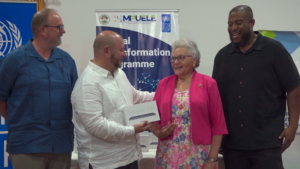 A new initiative has been unveiled to enhance the digital ability of senior citizens in Belize. The Senior Citizen Digital Skills Training Program will bring together elders from all corners of the country, pairing them with tech-savvy students from the University of Belize. These students will guide the seniors through the latest technologies, helping them confidently navigate the digital landscape. This empowering project aims to bridge the digital divide, enabling seniors to stay connected with loved ones and easily access essential online services. News Five’s Britney Gordon reports.
A new initiative has been unveiled to enhance the digital ability of senior citizens in Belize. The Senior Citizen Digital Skills Training Program will bring together elders from all corners of the country, pairing them with tech-savvy students from the University of Belize. These students will guide the seniors through the latest technologies, helping them confidently navigate the digital landscape. This empowering project aims to bridge the digital divide, enabling seniors to stay connected with loved ones and easily access essential online services. News Five’s Britney Gordon reports.
Britney Gordon, Reporting
Technology is advancing at a rapid rate. With it, the world’s archive of information is accessible at the touch of a fingertip; but for those born before this technology was invented, it is difficult to navigate this online world. For every hundred Belizeans, there are about eight older citizens. It is expected that the number will more than double by 2050. That is why Belize is taking steps to ensure that they are equipped with the skills needed to survive in digital landscapes with the launch of a digital skills training program for senior citizens. Minister of E-Governance Michel Chebat detailed the scope of the project.
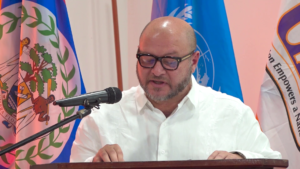
Michel Chebat
Michel Chebat, Minister of E-Governance
“This training will have sessions occurring countrywide covering topics such as the basic button functionality of devices. And include more advanced lessons, such as app downloads and usage. We will also ensure that tablet devices are provided for those who wish to learn but do not have a device of their own. Ensuring accessibility for those who need it the most.”
Supported by the United Nations Development Program, this will also equip older adults with essential online skills such as transferring funds, making phone calls, and booking appointments. Deputy Resident Representative of UNDP Belize, Micheal Lund, emphasized the need to ensure senior citizens are advancing their skill set as the country moves towards modernization.
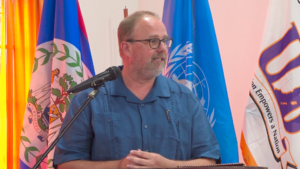
Micheal Lund
Micheal Lund, Deputy Resident Representative, UNDP Belize
“The Digital Inclusion Program is working to bridge this gap, ensuring that all persons have the opportunity to harness the benefit of technology. With the establishment of fourteen digital connect centers throughout the country, we are already breaking down the barriers to access. However, the value of access only holds true if individuals get the skills to effectively use the computer to computers and the, and navigate online government services.”
The training sessions will be facilitated by the University of Belize, enabling students to conduct the training sessions with elders. UB President, Dr. Vincent Palacio explained how the initiative benefits both parties.
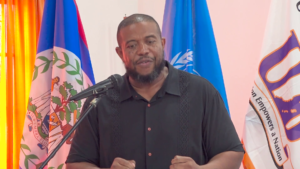
Vincent Palacio
Dr. Vincent Palacio, President, UB
“When we empower our students to help our elders navigate the world of technology, we’re building relationships. Imagine a young person sitting down with a grandparent, showing them how to video call family members or access important services online. In these moments, our elders gain something invaluable, the ability to stay connected, informed, and engaged in a world that’s becoming increasingly digital. We’re truly helping this segment of the population. Our young people are learning just as much, developing empathy.”
In a society that is moving away from the standardization of cash payments, senior citizens may begin to feel frustrated at their inability to manage their finances. Corine Gallego, an older citizen representative, shared her experience with this dilemma.
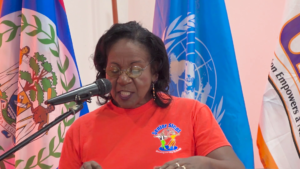
Corine Gallego
Corine Gallego, Older Citizens Representative
“The banks no longer issue bankbooks which you can physically check to see your deposits, withdrawals, or checks you have written to see when they are cashed. It’s all done online. When traveling in foreign countries, you’re required to check in your luggage digitally at the airport or better still from your devices at home. Recently I traveled abroad and thought, Oh, I don’t want to run up my credit card any higher, so I’ll pay for baggage with cash. Imagine my surprise when the airline employee told me they didn’t take cash.”
In some instances, senior citizens may need to purchase items such as medication or appliances abroad, but they are unable to do so without assistance. There have been several digital training sessions for senior citizens in the past, but as technology advances, the need for updated programs remains.
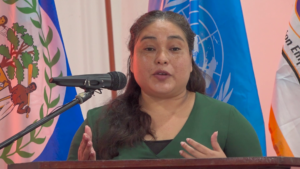
IX Chel Poot
IX Chel Poot, Executive Director, NCA
“In 2021, the National Council on Aging held the first round of virtual training in digital literacy in collaboration with CETO. And it brought into focus for us two very important points. One, that older persons are capable of adapting and learning once they are given the opportunity and the space to do so. Two, that the challenges faced when becoming a digital native doesn’t change with age. Our older participants were interested in exiting WhatsApp groups and blocking people on Facebook and knowing how to get out of email trains. So those are challenges that older people were facing.”
Also partnering in this program is the National Council of Aging, which is committed to helping elders gain the confidence to make decisions on their own and take back control over their presence in online spaces. Britney Gordon for News Five.






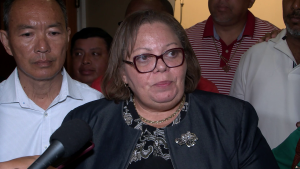
Facebook Comments